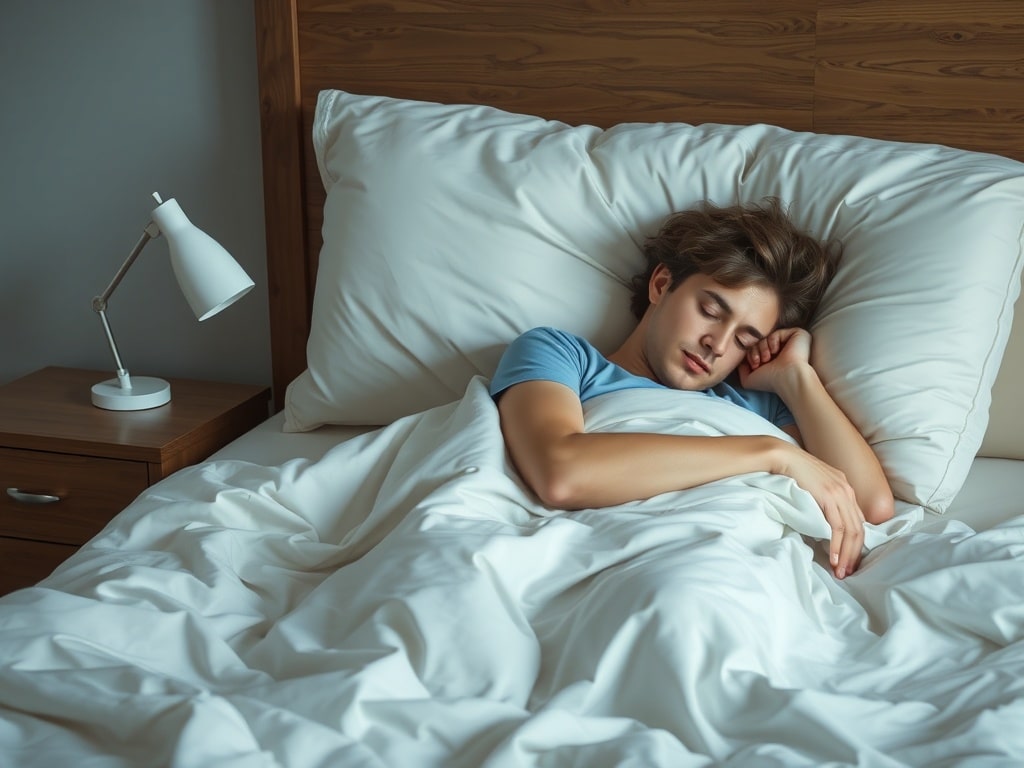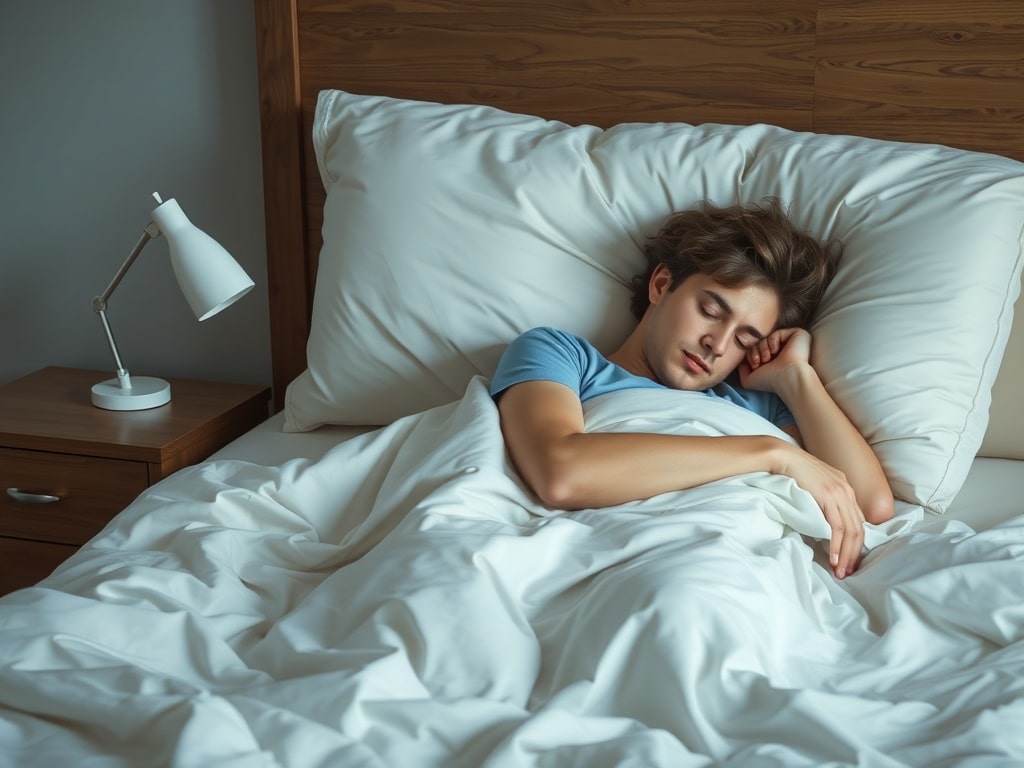Unlock Deep Sleep: The Ultimate Guide to Sleeping Better Tonight
The Quest for Restful Nights: Why Sleep Better Tonight Matters
Imagine waking up feeling truly refreshed, energized, ready to conquer the day. For many, this is a distant dream, replaced by the harsh reality of restless nights and groggy mornings. Are you tossing and turning, counting sheep until the sun peeks through the curtains? The ability to sleep better tonight isn't just about comfort; it's about your health, your well-being, and your overall quality of life. Let's dive deep into the science and strategies that can help you unlock the door to deep, restorative sleep.
Understanding Sleep: More Than Just Downtime
Sleep isn't merely a period of inactivity; it's a fundamental biological process vital for our physical and mental health. During sleep, our bodies repair tissues, consolidate memories, and regulate hormones. It's the engine that keeps us running smoothly. Think of it like this: your brain is a computer, and sleep is the crucial maintenance window that allows it to defrag, update its software, and clear out unnecessary files.
- Physical Restoration: Repairs muscle damage, strengthens the immune system, and regulates metabolism.
- Cognitive Enhancement: Consolidates memories, improves focus, and enhances problem-solving skills.
- Emotional Regulation: Helps process emotions, reduce stress, and improve mood.
Are You Sleep-Deprived? Recognizing the Signs
Many of us are walking around in a state of chronic sleep deprivation, often without even realizing it. The effects can be subtle at first, but they accumulate over time, taking a toll on our health and well-being. Here are some key signs that you're not getting enough quality sleep:
- Excessive Daytime Sleepiness: Feeling drowsy even after a full night's sleep.
- Difficulty Concentrating: Trouble focusing at work or during daily tasks.
- Irritability and Mood Swings: Becoming easily frustrated or experiencing unexplained mood changes.
- Impaired Memory: Forgetting things easily or struggling to recall information.
- Weakened Immune System: Getting sick more often or taking longer to recover.
- Increased Appetite and Weight Gain: Sleep deprivation can disrupt hormones that regulate hunger, leading to cravings and weight gain.
The Symphony of Sleep: Unveiling Sleep Cycles
Sleep isn't a uniform state; it's a cyclical process involving different stages, each with its unique characteristics. These cycles, typically lasting around 90-120 minutes, orchestrate various physiological processes essential for restoration and cognitive function.
NREM (Non-Rapid Eye Movement) Sleep:
- Stage 1: The transition from wakefulness to sleep, characterized by light sleep and muscle relaxation.
- Stage 2: Deeper sleep with slower brain waves and occasional bursts of activity called sleep spindles.
- Stage 3: The deepest stage of sleep, characterized by slow-wave activity and crucial for physical restoration.
REM (Rapid Eye Movement) Sleep:
- Characterized by rapid eye movements, increased brain activity, and muscle paralysis.
- This stage is crucial for memory consolidation, learning, and emotional processing. Most dreaming occurs during REM sleep.
To sleep better tonight, aim to cycle through these sleep stages adequately. Disruptions to these cycles can hinder the restorative effects of sleep.
Crafting Your Bedtime Ritual: A Pathway to Slumber
A relaxing bedtime routine signals to your body that it's time to wind down and prepare for sleep. Consistency is key; try to follow the same routine every night to reinforce the association between these activities and sleep.
- Dim the Lights: Reduce exposure to bright light, especially blue light from screens, which can suppress melatonin production.
- Take a Warm Bath or Shower: The drop in body temperature after a warm bath can promote relaxation and sleepiness.
- Read a Book: Choose a relaxing book (not an e-reader) that will help you unwind.
- Listen to Calming Music: Soothing music or nature sounds can help quiet your mind.
- Practice Relaxation Techniques: Deep breathing exercises, meditation, or gentle stretching can reduce stress and prepare you for sleep.
Creating Your Sleep Sanctuary: Optimizing Your Environment
Your bedroom should be a haven for sleep, a place where you feel comfortable, safe, and relaxed. Creating a sleep-friendly environment can significantly improve your chances of sleep better tonight.
- Keep it Dark: Use blackout curtains or blinds to block out any external light.
- Keep it Quiet: Use earplugs or a white noise machine to mask any distracting sounds.
- Keep it Cool: Maintain a cool room temperature (around 65 degrees Fahrenheit) to promote sleep.
- Invest in a Comfortable Mattress and Pillows: Your mattress and pillows should provide adequate support and comfort.
- Declutter Your Bedroom: A cluttered bedroom can be visually distracting and anxiety-provoking.
Fueling Your Sleep: The Link Between Diet and Rest
What you eat and drink can have a significant impact on your sleep quality. Certain foods and beverages can interfere with sleep, while others can promote relaxation and sleepiness.
- Avoid Caffeine and Alcohol Before Bed: These substances can disrupt sleep cycles and prevent you from falling asleep easily.
- Limit Sugary Foods and Processed Carbs: These can cause blood sugar spikes and crashes, leading to restlessness and poor sleep.
- Include Tryptophan-Rich Foods: Tryptophan is an amino acid that helps produce melatonin and serotonin, both of which promote sleep. Examples include turkey, chicken, nuts, and seeds.
- Consider Magnesium-Rich Foods: Magnesium can help relax muscles and promote sleep. Examples include leafy green vegetables, nuts, and whole grains.
- Stay Hydrated: Dehydration can lead to restless legs and disrupted sleep but avoid drinking excessive fluids right before bed.
Exercise and Sleep: A Balanced Equation
Regular exercise can improve sleep quality, but the timing of your workouts matters. Engaging in vigorous exercise too close to bedtime can interfere with sleep. Aim to exercise earlier in the day to reap the benefits without disrupting your sleep.
- Aim for at Least 30 Minutes of Moderate-Intensity Exercise Most Days of the Week: This can improve overall health and sleep quality.
- Avoid Strenuous Exercise Within 3 Hours of Bedtime: This can elevate your heart rate and body temperature, making it harder to fall asleep.
- Consider Gentle Exercises Like Yoga or Tai Chi: These can promote relaxation and improve sleep quality.
Taming the Mental Beast: Managing Stress and Anxiety
Stress and anxiety are major culprits when it comes to sleep problems. When your mind is racing, it can be difficult to relax and fall asleep. Learning to manage stress and anxiety is crucial for sleep better tonight.
- Practice Relaxation Techniques: Deep breathing exercises, meditation, and progressive muscle relaxation can help calm your mind and body.
- Journaling: Writing down your thoughts and feelings before bed can help you process them and release them from your mind.
- Spend Time in Nature: Exposure to nature has been shown to reduce stress and improve sleep quality.
- Talk to a Therapist or Counselor: If stress and anxiety are significantly impacting your sleep and daily life, consider seeking professional help.
Natural Sleep Aids: Exploring Options with Caution
Many natural sleep aids and supplements are available over-the-counter, but it's important to use them with caution and consult with a healthcare professional before trying them.
- Melatonin: A hormone that regulates the sleep-wake cycle. It can be helpful for jet lag or shift work, but long-term use is not recommended without medical advice.
- Valerian Root: An herb that may promote relaxation and sleep.
- Chamomile: An herb that has calming properties and can be consumed as tea.
- Magnesium: Can help relax muscles and prepare the body for sleep.
Important Note: Natural sleep aids are not a substitute for healthy sleep habits. It is important to address the underlying causes of your sleep problems.
When to Seek Professional Guidance: Knowing Your Limits
If you've tried various strategies to improve your sleep and are still struggling, it's time to seek professional help. Chronic sleep problems can have serious consequences for your health and well-being.
- Difficulty Falling Asleep or Staying Asleep for More Than 3 Months: This could indicate a chronic sleep disorder.
- Excessive Daytime Sleepiness That Interferes With Your Daily Life: This could be a symptom of narcolepsy or another sleep disorder.
- Snoring Loudly or Gasping for Air During Sleep: This could be a sign of sleep apnea.
- Restless Legs Syndrome: An irresistible urge to move your legs, especially at night.
A doctor can assess your sleep problems, rule out any underlying medical conditions, and recommend appropriate treatment options.
Understanding Sleep Disorders: Unveiling the Culprits
Various sleep disorders can disrupt sleep patterns and lead to daytime dysfunction. It's important to recognize the symptoms of these disorders and seek appropriate treatment.
- Insomnia: Difficulty falling asleep, staying asleep, or waking up too early.
- Sleep Apnea: A condition in which breathing repeatedly stops and starts during sleep.
- Restless Legs Syndrome (RLS): An irresistible urge to move your legs, often accompanied by uncomfortable sensations.
- Narcolepsy: A neurological disorder that causes excessive daytime sleepiness and sudden sleep attacks.
Busting Common Sleep Myths: Separating Fact from Fiction
Many misconceptions surround sleep, leading to unhealthy habits and unrealistic expectations. Let's debunk some common sleep myths.
- Myth: You can catch up on sleep on the weekends. While you can partially compensate for sleep deprivation, it's not a long-term solution. Consistency is key for healthy sleep habits.
- Myth: Alcohol helps you sleep. While alcohol may initially make you feel sleepy, it disrupts sleep cycles and can lead to fragmented sleep.
- Myth: Everyone needs 8 hours of sleep. Sleep needs vary from person to person. Some people may thrive on 7 hours, while others need 9.
- Myth: Snoring is harmless. Snoring can be a sign of sleep apnea, a serious sleep disorder that can have significant health consequences.
Mindfulness for Sleep: Quieting the Inner Chatter
Mindfulness and meditation techniques can be powerful tools for improving sleep. These practices help calm the mind, reduce stress, and promote relaxation, preparing you for a restful night's sleep.
- Mindful Breathing: Focus on your breath, noticing the sensation of each inhale and exhale.
- Body Scan Meditation: Bring awareness to different parts of your body, noticing any sensations without judgment.
- Guided Meditation: Listen to a guided meditation recording that leads you through a relaxation exercise.
Tech Troubles? Mitigating Technology's Impact on Sleep
The pervasive use of technology can significantly impact sleep. The blue light emitted from screens can suppress melatonin production, making it harder to fall asleep. Establish healthy technology boundaries to sleep better tonight.
- Avoid Screen Time Before Bed: Put away your phone, tablet, and computer at least an hour before bedtime.
- Use Blue Light Filters: If you must use screens, enable blue light filters on your devices or wear blue light-blocking glasses.
- Charge Your Devices Outside of Your Bedroom: This can help you avoid the temptation to check your phone before bed or during the night.
Building a Sleep-Positive Lifestyle: Long-Term Strategies
Improving your sleep isn't a quick fix; it's a lifestyle change. By adopting healthy sleep habits and maintaining a consistent routine, you can cultivate long-term sleep health.
- Establish a Regular Sleep Schedule: Go to bed and wake up at the same time every day, even on weekends.
- Create a Relaxing Bedtime Routine: Follow the same routine every night to signal to your body that it's time to wind down.
- Optimize Your Sleep Environment: Make sure your bedroom is dark, quiet, and cool.
- Manage Stress and Anxiety: Practice relaxation techniques or seek professional help if needed.
- Prioritize Sleep: Make sleep a priority in your life, just like you would any other important aspect of your health and well-being.
Tonight Can Be Different: Begin Your Journey to Better Sleep
You now have a comprehensive toolkit to sleep better tonight. Start small, embrace consistency, and be patient with yourself. Sweet dreams are within reach – reclaim your nights, and revitalize your days!


